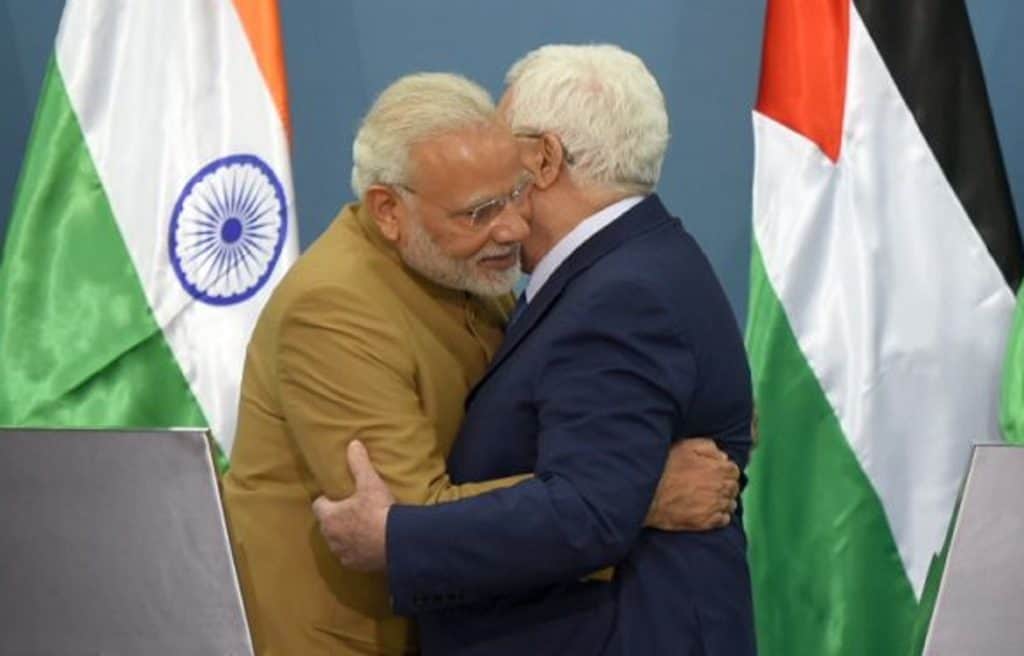By Dr Khushnam P N
Palestinian President, Mahmoud Abbas, proposing India’s mediation in the Israeli-Palestinian conflict, told the visiting Indian Prime Minister Narendra Modi, in February 2018, that “we can count on India, with its status as a great power, its historical role in the non-aligned movement and International forums.”

A UN delegation on Palestine, United Nations Committee on the Exercise of the Inalienable Rights of the Palestinian People (CEIRPP), visited India, in the first week of March 2020, with the aim to engage India, which shares cordial relations with both the parties, and supports multilateralism and the peaceful resolution of the century old vexing Palestine question.
India can take on the role through its extensive relations with the main actors of the region, deepened with the numerous visits of the Indian Prime Minister and the warm responses of the region.
At present, Iran-Israel rapprochement is at the heart of the Palestine conflict resolution, for an abiding peace in the region. India is the strategic partner of both and can, therefore, be a trusted and credible mediator.
The acceptance of ‘two state solution’ of the Israel-Palestine dispute by the Palestinian Leadership has given a de facto recognition to the state of Israel. Last few years Arab states willingness to have normal relations with Israel have widely been reported. In such situation, Iran only remains out of this orbit of normalization.
The Iranian domestic politics has also shown sufficient maturity with increasing hold of the reformists in the country. Given the past linkages, the current situation in the region warrants the two states to move closer, following their prudent national interests, which are mutually complementary, for bringing peace in the region.
Till the Islamic Revolution of Iran in 1979, both of these West Asian countries were close strategic partner aligned with the United States. Iran’s belligerent revolutionary attack on Israel and support to the Palestine issue subsequently led to the evolution of the extreme hostility between the two countries.
The cooperation between the two countries was based on strategic vision based on shared geopolitical interests which forced them to continue with their economic cooperation, military hardware and intelligence sharing even after the revolution. The roots of this cooperation can be traced way back in the 1950s in the wake of rising Arab nationalist movement which was an extreme cause of concern for both Iran and Israel.
The Iraqi invasion of Iran in 1980 finally brought the national interests and geopolitical necessity of cooperation of the two against the forces of Arabism and Ba’athism, despite their official hostility.
In the post-Khomeini period which coincided with the end of Iran-Iraq war, and the Iraqi invasion of Kuwait, the consequent First Gulf war (Operation Desert storm) changed the geopolitical balance in the region. Now Iraq was no longer a security threat to Israel. With the Middle East Peace process in the early 1990s and the establishment of the Palestinian Authority, Iran’s approach towards Israel witnessed perceptibly substantial moderation. This cooperation was necessary for Israeli energy security and Iranian oil export. The cooperation also touched other area like agriculture, transportation and disaster management (Iran Earthquake).
During the first presidency of Benjamin Netanyahu, there was a growing view in Israel in favour of dialogue with Iran. The talk of “Dialogue of Civilization” and constructive engagement during the Khatami presidency in later 1990s further improved the possibility of the rapprochement between the two. Even there was a report of acceptance of the ‘Two State Solution’ of Palestine by the Supreme Leader, Ali Khamenei in 2003. The US war with Iraq did not allow this possibility to fructify.
In the last decade, there is fast evolving and intensifying rivalry and hostility of Iran with Saudi Arabia. The two are face to face in every disputes and violent spots in the region from Syria, Lebanon, Yemen, Bahrain and Qatar with direct involvement and proxies to strategic support and funding of the parties on the ground. The favourable views of Oman and Kuwait towards Iran and the latter’s growing ties with post Saddam Iraq is making Saudi hostility of Iran a bigger concern for Tehran. Qatar blockade has further tilted the balance in favour of Iran which has also produced a conducive environment for Iran mending and expanding its relations with Turkey.
The Syrian crisis, Iraqi turmoil, ISIS violence and spectre of chaos in the region have made the security and stability of both Iran and Israel very vulnerable. Neither Iran nor Israel can alone ensure the requisite to set the region back to normalcy. The region at large and strategic partnership of Iran and Israel is vital for India’s interests in the region and its pursuit to power in the emerging world order. It is, therefore, of utmost national interest for India to take both on board to ensure peace and stability in its extended neighbourhood.
The emerging geostrategic setting, with the gradual withdrawal of US, and the changing global order amidst the pandemic underway, mean that it is in the mutual interests of both Iran and Israel to step towards reconciliation. This is surely in consonance with their geopolitical interests and necessary to deal with their contemporary challenges. It would allow Iran to work for its domestic development and regional power aspiration, breaking its international isolation, at the same time bringing the much needed relief to Israel from its ever-increasing security threats and vulnerability from Hezbollah, Hamas, Islamic Jihad and the Syrian crisis.
This cooperation would help both the countries to develop coordination to deal with extremism in the region, a common threat to both. A notable point is that there is large number of Iranian Jews, around 200,000 lives in Israel and Iran is still home to the largest Jewish population in the region.
The studied silence of Israel in the current escalating crisis in the Gulf between Iran and US is understandable. Their deeper mutual geopolitical interests are at stake if this tension turns into a war. In the absence of such rapprochement, it is very hard on the part of US to take a correct course and running an imminent danger of harming its own interests and standing in this extremely crisis ridden region.
The rapprochement may eliminate the danger of nuclear Iran which both Israel and US are concerned about and the cause for the dangerous level of military deployment and current belligerent exchanges.
Every crisis entails numerous opportunities, also helping to resolve many long standing problems. The current Gulf tension seems to have brought such a condition when old alliance and linkages of Iran and Israel can avert the impending conflagration and set the region in a much required path to peace and security. They must use their leverages and influences in the Arab states of the region like Oman, Qatar and Kuwait to establish the needful channel to sort out their disputes and differences in the light of their deeper geopolitical interests. India’s soft power in the region and its peaceful pursuits provides it credible stature to reach out to one and all in the region with global respect and acceptance (UN proposal).
This rapprochement would also unburden the US policy from its unwilling and costly military engagement in the region. The invasion of Iraq and the engagement in Syria need a serious consideration of its military pursuit as any miscalculation may push US in an endless conflict in the region. India can use its leverage with all the three-Iran, Israel and the US and prudence lies in an early informal contact to ease the escalating tension in the region.
Israel can really gain by impressing upon Iran its concerns about the missile programme of the latter, and Iran may commit to cap its missile programme as it would lose the necessity with the normalization of its relation with Israel. Israel needs a pragmatic re-evaluation of its ‘Periphery Doctrine’ based on its national interest and security for an inclusive and sustainable regional security
It is an extremely important window of opportunity for India to play the role of mediation in the Palestinian question by pragmatic consideration of concerns of Iran and Israel, as well as US, its close strategic partners. This is sure to spur India’s image as significant power in the region in line with its ‘Link West’ policy. Besides, it can safeguard its geopolitical interests, energy security and strategic vision in the region and beyond. Such a partnership of Three-I (Iran, Israel and India) can change this region of turmoil into the region of peace, prosperity and stability. It is the sure route of India’s power in region and in the emerging post-pandemic world order.
Author: Dr Khushnam P N (Independent IR and Regional Security Researcher and Analyst, Specialization: Iran, US & Gulf Security. Bangalore, India)
(The views expressed in this article belong only to the author and do not necessarily reflect the editorial policy or views of World Geostrategic Insights).







